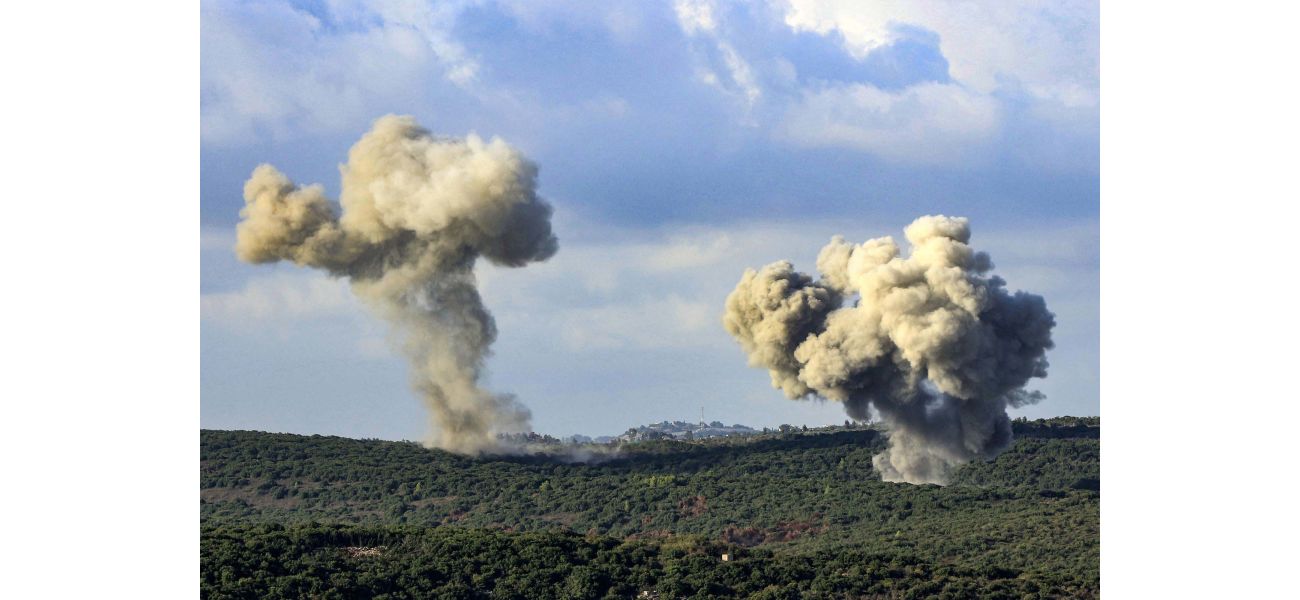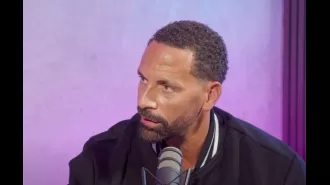Hezbollah launches rockets far into northern Israel amidst rising tensions.
Recent intense fighting between Israel and Hezbollah in Gaza involved more extensive projectile attacks by the Lebanese group.
September 23rd 2024.

In the past 48 hours, there has been a significant increase in the exchange of fire between Israel and Hezbollah, marking the most intense conflict in almost a year of war in Gaza. The Lebanese militant group has fired projectiles deeper into Israeli territory than ever before, causing concern and alarm among civilians. On Saturday, Israel took action by launching nearly 300 strikes on Hezbollah targets, describing it as a preemptive measure to prevent a planned attack. In response, Hezbollah has been launching a barrage of rockets and other projectiles at Israel, claiming it is retaliation for previous Israeli attacks in Lebanon.
The situation escalated even further with a series of violent events. A top Hezbollah commander and other senior operatives were killed in an Israeli airstrike in Beirut, which also claimed the lives of at least 45 other people. This strike came after two days of blasts targeting pagers and walkie-talkies used by Hezbollah members. The tension in the region is at an all-time high, and people are worried about the potential for further escalation.
The first attack occurred on Tuesday afternoon, when a simultaneous explosion of pagers rocked several parts of Lebanon, including the capital Beirut and other towns known to be strongholds for Hezbollah. Then, exactly 24 hours later, there was a second attack in the suburbs of Beirut and the southern part of the country, where walkie-talkies detonated. The death toll from both attacks is currently at 39, with 12 fatalities on Tuesday and 27 on Wednesday.
The explosions were followed by a devastating Israeli strike on Friday, targeting the capital city of Beirut. This attack killed a top Hezbollah commander, Ibrahim Aqil, and leveled a multi-storey building in a densely populated neighborhood. This series of events has put the entire region on edge, as Hezbollah has responded by launching rockets and missiles at northern Israel, reaching deeper into Israeli territory than ever before. Schools have closed, and gatherings have been restricted in many areas.
In response to the Israeli airstrike, Hezbollah claimed to have targeted an air base with Fadi 1 and Fadi 2 missiles, longer-range weapons that have not been used in previous attacks. While most of the missiles were intercepted, some caused damage. The Israeli military reported impacts in several areas, including Kiryat Bialik, Tsur Shalom, and Moreshet near the port city of Haifa, marking one of the deepest direct hits by Hezbollah since the 2006 Israel-Lebanon war.
The situation is incredibly tense, with both sides exchanging fire and making threats. Hezbollah has stated that their attacks are in retaliation for the deaths of civilians in Israeli strikes in Lebanon. Meanwhile, Israel claims that their actions are preemptive and necessary for self-defense. Both sides seem determined to continue the fight, with Hezbollah's leader stating that a "battle without limits" is now underway.
The question on everyone's mind is whether or not this conflict will escalate even further. There have been consistent exchanges of fire between Israel and Hezbollah since the war in Gaza began, sparking fears of a larger regional conflict. While tensions have de-escalated in the past, the intensity of the current situation is unprecedented. There is a real concern that this could turn into a full-fledged war that could involve the entire region and Israel's main ally, the United States.
The timing of these attacks raises questions as well. Israel and Hezbollah have been in conflict for many years, but the attacks have intensified since the start of the war in Gaza last October. The axis led by Iran, which includes Hezbollah, has been engaged in a simmering conflict with Israel and its allies across the Middle East. They have stated that they will continue attacking Israeli targets as long as the war in Gaza continues, positioning themselves as a supportive front for the Palestinians in the strip.
Some speculate that Israel may have chosen to strike now because they believed Hezbollah had discovered the capabilities of the pagers and walkie-talkies, making it a "use it or lose it" moment. Others believe that Israeli Prime Minister Benjamin Netanyahu may have been trying to gain domestic support by taking action against the threat of Hezbollah's rockets from southern Lebanon. It is clear that the situation is complex and multi-faceted, with both sides having their own motivations and objectives.
In the midst of all this, the focus remains on the safety and security of civilians. The Israeli president has stated that they are not interested in being at war with Lebanon, but instead blames Hezbollah for the escalation of violence. Despite admitting to being weakened by the attacks, Hezbollah shows no signs of backing down. Israel, on the other hand, is determined to ensure the safety of its citizens and restore peace in the northern region. As the situation continues to unfold, the world watches with bated breath, hoping for a peaceful resolution to this ongoing conflict.
The situation escalated even further with a series of violent events. A top Hezbollah commander and other senior operatives were killed in an Israeli airstrike in Beirut, which also claimed the lives of at least 45 other people. This strike came after two days of blasts targeting pagers and walkie-talkies used by Hezbollah members. The tension in the region is at an all-time high, and people are worried about the potential for further escalation.
The first attack occurred on Tuesday afternoon, when a simultaneous explosion of pagers rocked several parts of Lebanon, including the capital Beirut and other towns known to be strongholds for Hezbollah. Then, exactly 24 hours later, there was a second attack in the suburbs of Beirut and the southern part of the country, where walkie-talkies detonated. The death toll from both attacks is currently at 39, with 12 fatalities on Tuesday and 27 on Wednesday.
The explosions were followed by a devastating Israeli strike on Friday, targeting the capital city of Beirut. This attack killed a top Hezbollah commander, Ibrahim Aqil, and leveled a multi-storey building in a densely populated neighborhood. This series of events has put the entire region on edge, as Hezbollah has responded by launching rockets and missiles at northern Israel, reaching deeper into Israeli territory than ever before. Schools have closed, and gatherings have been restricted in many areas.
In response to the Israeli airstrike, Hezbollah claimed to have targeted an air base with Fadi 1 and Fadi 2 missiles, longer-range weapons that have not been used in previous attacks. While most of the missiles were intercepted, some caused damage. The Israeli military reported impacts in several areas, including Kiryat Bialik, Tsur Shalom, and Moreshet near the port city of Haifa, marking one of the deepest direct hits by Hezbollah since the 2006 Israel-Lebanon war.
The situation is incredibly tense, with both sides exchanging fire and making threats. Hezbollah has stated that their attacks are in retaliation for the deaths of civilians in Israeli strikes in Lebanon. Meanwhile, Israel claims that their actions are preemptive and necessary for self-defense. Both sides seem determined to continue the fight, with Hezbollah's leader stating that a "battle without limits" is now underway.
The question on everyone's mind is whether or not this conflict will escalate even further. There have been consistent exchanges of fire between Israel and Hezbollah since the war in Gaza began, sparking fears of a larger regional conflict. While tensions have de-escalated in the past, the intensity of the current situation is unprecedented. There is a real concern that this could turn into a full-fledged war that could involve the entire region and Israel's main ally, the United States.
The timing of these attacks raises questions as well. Israel and Hezbollah have been in conflict for many years, but the attacks have intensified since the start of the war in Gaza last October. The axis led by Iran, which includes Hezbollah, has been engaged in a simmering conflict with Israel and its allies across the Middle East. They have stated that they will continue attacking Israeli targets as long as the war in Gaza continues, positioning themselves as a supportive front for the Palestinians in the strip.
Some speculate that Israel may have chosen to strike now because they believed Hezbollah had discovered the capabilities of the pagers and walkie-talkies, making it a "use it or lose it" moment. Others believe that Israeli Prime Minister Benjamin Netanyahu may have been trying to gain domestic support by taking action against the threat of Hezbollah's rockets from southern Lebanon. It is clear that the situation is complex and multi-faceted, with both sides having their own motivations and objectives.
In the midst of all this, the focus remains on the safety and security of civilians. The Israeli president has stated that they are not interested in being at war with Lebanon, but instead blames Hezbollah for the escalation of violence. Despite admitting to being weakened by the attacks, Hezbollah shows no signs of backing down. Israel, on the other hand, is determined to ensure the safety of its citizens and restore peace in the northern region. As the situation continues to unfold, the world watches with bated breath, hoping for a peaceful resolution to this ongoing conflict.
[This article has been trending online recently and has been generated with AI. Your feed is customized.]
[Generative AI is experimental.]
0
0
Submit Comment





